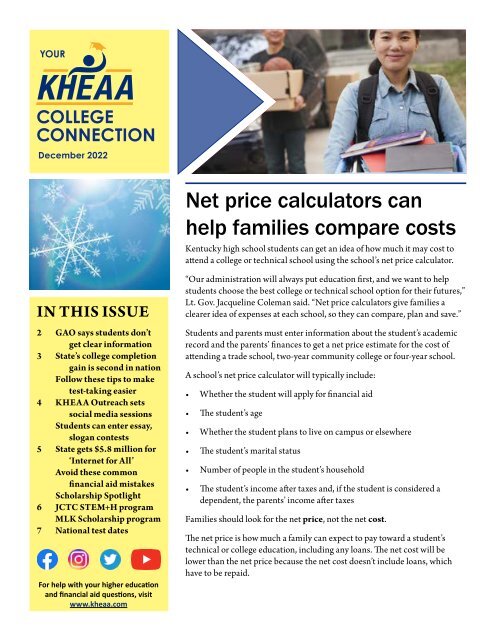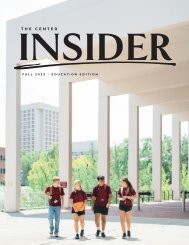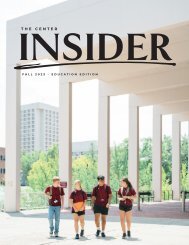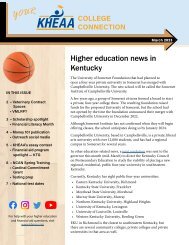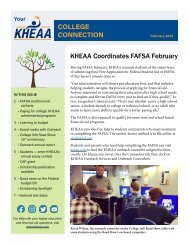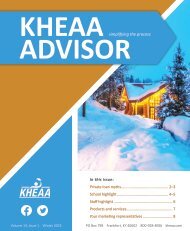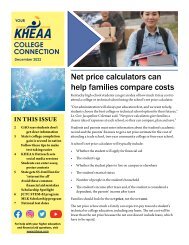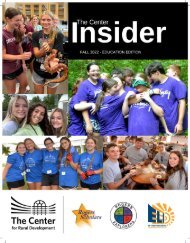YKCC December 2022 revised
- No tags were found...
Create successful ePaper yourself
Turn your PDF publications into a flip-book with our unique Google optimized e-Paper software.
YOUR<br />
COLLEGE<br />
CONNECTION<br />
<strong>December</strong> <strong>2022</strong><br />
Net price calculators can<br />
help families compare costs<br />
Kentucky high school students can get an idea of how much it may cost to<br />
attend a college or technical school using the school’s net price calculator.<br />
IN THIS ISSUE<br />
2 GAO says students don’t<br />
get clear information<br />
3 State’s college completion<br />
gain is second in nation<br />
Follow these tips to make<br />
test-taking easier<br />
4 KHEAA Outreach sets<br />
social media sessions<br />
Students can enter essay,<br />
slogan contests<br />
5 State gets $5.8 million for<br />
‘Internet for All’<br />
Avoid these common<br />
financial aid mistakes<br />
Scholarship Spotlight<br />
6 JCTC STEM+H program<br />
MLK Scholarship program<br />
7 National test dates<br />
For help with your higher education<br />
and financial aid questions, visit<br />
www.kheaa.com<br />
“Our administration will always put education first, and we want to help<br />
students choose the best college or technical school option for their futures,”<br />
Lt. Gov. Jacqueline Coleman said. “Net price calculators give families a<br />
clearer idea of expenses at each school, so they can compare, plan and save.”<br />
Students and parents must enter information about the student’s academic<br />
record and the parents’ finances to get a net price estimate for the cost of<br />
attending a trade school, two-year community college or four-year school.<br />
A school’s net price calculator will typically include:<br />
• Whether the student will apply for financial aid<br />
• The student’s age<br />
• Whether the student plans to live on campus or elsewhere<br />
• The student’s marital status<br />
• Number of people in the student’s household<br />
• The student’s income after taxes and, if the student is considered a<br />
dependent, the parents’ income after taxes<br />
Families should look for the net price, not the net cost.<br />
The net price is how much a family can expect to pay toward a student’s<br />
technical or college education, including any loans. The net cost will be<br />
lower than the net price because the net cost doesn’t include loans, which<br />
have to be repaid.
2<br />
GAO says students don’t<br />
get clear cost information<br />
Colleges are not giving students clear and standard<br />
information in their financial aid offers, which often don’t<br />
include the net price or understate that price, according<br />
to a report by the Government Accountability Office.<br />
The GAO analyzed financial aid offers from 176 colleges<br />
from across the country. The sample includes offers<br />
with at least a Pell Grant, a direct subsidized or direct<br />
unsubsidized loan, and a Parent PLUS loan. GAO<br />
assessed those offers against a list of eight best practices<br />
for financial aid offers based on guidance from the<br />
Department of Education and 22 federal agencies. Those<br />
best practices include:<br />
• itemizing key direct and indirect costs,<br />
• providing a total cost of attendance (COA) that<br />
includes key costs,<br />
• estimating the net price (by subtracting only gift aid<br />
from key costs), and<br />
• separating gift aid, loans, and work-study.<br />
GAO estimates that 63% of colleges follow five or fewer<br />
of the eight best practices. No college in the sample<br />
followed all eight best practices.<br />
An estimated 55% of institutions didn’t itemize key<br />
direct and indirect costs, 55% didn’t provide a total cost<br />
of attendance that includes key costs, and 91% didn’t<br />
estimate the net price by subtracting only gift aid from<br />
key direct and indirect costs. Twenty-two percent of<br />
colleges didn’t provide information about college costs in<br />
their aid offers.<br />
“Colleges present cost and financial aid information<br />
differently, making it difficult for students and parents<br />
to compare offers and college affordability,” the report<br />
states. “Although a recent law requires colleges to provide<br />
standard financial aid information to certain student<br />
veterans, the lack of financial aid offer requirements<br />
could lead other students to make uninformed and costly<br />
decisions, such as enrolling in an unaffordable college.”<br />
According to the GAO, colleges often underestimate the<br />
net price in two ways. The first is not basing the net price<br />
estimate on key direct and indirect costs. The second is<br />
subtracting non-gift aid —student loans, Parent PLUS<br />
loans, or work-study — from the estimate.<br />
Many colleges also didn’t label the type (grants, loans,<br />
etc.) or the source (federal, state, institutional, or private)<br />
of the aid in their offers. GAO said that information helps<br />
students determine what type of aid is being offered and<br />
is valuable for students to identify federal grants and<br />
loans.<br />
Another problem, according to GAO, is that more than<br />
half the colleges didn’t tell students what they should<br />
do after receiving their financial aid offers. Sixty-five<br />
percent of colleges didn’t provide key details, such as<br />
the academic requirements to maintain a scholarship or<br />
important details about work-study.<br />
GAO is asking Congress to require colleges to provide<br />
students financial aid offers that follow best practices<br />
so students “receive the information they need in their<br />
financial aid offers to make informed education and<br />
financial choices.”
Follow these tips to make<br />
taking tests much easier<br />
An all-night cram session before a test is a time-honored<br />
college tradition. It’s also unnecessary, bad for your<br />
health, and all too often bad for your grades.<br />
State’s college completion<br />
gain is one of best in nation<br />
Kentucky’s gains in six-year college completion rates tied<br />
for second best in the nation, according to a National<br />
Student Clearinghouse Research Center report released<br />
last month.<br />
Completing College: National and State Reports updates<br />
the six-year college completion rates by tracking the<br />
enrollment and completion outcomes for students who<br />
entered college as freshmen in the fall of 2016. The<br />
figures show those outcomes as of this past June. College<br />
completion data are often based on a six-year period.<br />
Kentucky’s rate increased by 1.1 percent, making it one<br />
of only five states that saw gains of 1 percent or more.<br />
Although completion rates improved in over half the<br />
states, only Kentucky, Rhode Island (2.1 percent), Utah<br />
(1.1 percent), and Louisiana and Maryland (both 1.0<br />
percent), saw gains of 1 percent or more.<br />
Kentucky was one of just four states that saw completion<br />
rates at community colleges rise by more than 2.5<br />
percent. Kentucky’s community college completion rate<br />
increased by 3 percent, the second highest gain in the<br />
nation after South Dakota with gains of 4.1 percent.<br />
The national completion rate counts all students who<br />
enter postsecondary education for the first time each<br />
fall, enroll full-time or part-time at two-year or fouryear<br />
institutions, and complete their studies at any<br />
U.S. degree-granting school. The data also include<br />
information about students who complete after transfer.<br />
The first time you have a test in a class, you may have no<br />
way of knowing what might be on it. Some professors will<br />
test mainly on what they went over during their lectures.<br />
Others will test mainly over what you were supposed to<br />
read in the textbook. Still others will strike a balance.<br />
Some professors will tell you, maybe even have a review<br />
session. Pay attention and ask questions.<br />
• Take notes in every class. You’ll have to find a<br />
system that works for you. Trying to write down<br />
every word will leave you hopelessly lost. Make sure<br />
you get down enough to remind you of what was said.<br />
You can expand on those ideas later.<br />
• Read in stages. First, read the chapter overview or<br />
skim over the headings to get an idea of what the<br />
chapter contains. Then read the chapter, taking notes<br />
or underlining important ideas as you go along. Make<br />
a note of any questions you have. You can even make<br />
up self-study questions that will help you come test<br />
time. Some people find flash cards helpful.<br />
• Combine the reading and lecture notes while the<br />
lecture is still fresh in your mind.<br />
• Hold a study session with other students.<br />
Discussing what might be on the test may help you<br />
focus on the important ideas.<br />
• Review your notes on test day. Don’t overdo it.<br />
The longer you spend on one subject, the more your<br />
concentration drains away. Two hours should be the<br />
max you spend on one subject at one time.<br />
Use these tips so you won’t have to pull an all-nighter,<br />
and you’ll be rested and ready when you have the test in<br />
your hand.<br />
3
4<br />
KHEAA Outreach sets<br />
social media sessions<br />
KHEAA Outreach has set its social media schedule for<br />
the spring semester.<br />
The schedule is:<br />
January 9: In the Know: Resources for Minority<br />
Students, Facebook<br />
January 23: In the Know: Minority Student Resources,<br />
Twitter<br />
February 6: FAFSA February: Completed the FAFSA,<br />
What’s Next?, Facebook<br />
February 13: Financial Aid: What’s Not to Love!,<br />
Webinar<br />
February 20: FAFSA February: Finishing the FAFSA,<br />
Twitter<br />
March 6: Finding the Pot of Gold: Reviewing Your<br />
Award Letter, Facebook<br />
March 20: Finding the Pot of Gold: Award Letter Basics,<br />
Twitter<br />
April 3: Making “Cents”: Basics of Budgeting, Facebook<br />
April 10: Money 101: Introduction to Basic Finances,<br />
Webinar<br />
April 17: Making “Cents”: Basics of Borrowing,Twitter<br />
May 8: Resources for Adults: Adult Education, Facebook<br />
May 22: Resources for Adults: Learn about Adult<br />
Education in Kentucky, Twitter<br />
All sessions begin at 7 p.m. Eastern, 6 p.m. Central.<br />
The links are:<br />
www.facebook.com/KHEAA/<br />
www.twitter.com/KHEAA/<br />
Students can now enter<br />
essay, slogan contests<br />
Students in grades 9–12 can enter an essay contest<br />
sponsored by Kentucky Secretary of State Michael<br />
Adams, while students in grades 6–8 can enter a slogan<br />
contest. Adams will award prizes and recognize winners<br />
in a public ceremony.<br />
The essay question posed to high schoolers is, “What can<br />
Kentucky do to recruit more poll workers?” Students<br />
should limit their essays to 1,000 words.<br />
The slogan contest invites middle school students to<br />
suggest a slogan to promote poll worker recruitment.<br />
“To open the polls, we need poll workers. My twin<br />
challenges as Secretary of State are to ensure smooth<br />
elections and to enhance civic knowledge and<br />
participation, and this contest supports both missions,”<br />
Adams said.<br />
Whether submitted electronically or by mail, all entries<br />
must be received by the Secretary of State’s Office by 5<br />
p.m. (EST) on Tuesday, January 31.<br />
Learn more at www.sos.ky.gov/sos-office/Pages/<br />
essayslogan.aspx.
Avoid these common<br />
financial aid mistakes<br />
Many students spend too much for college by making<br />
some common mistakes when seeking financial aid.<br />
Follow these tips to make sure you get the aid you need.<br />
State gets $5.8 million<br />
‘Internet for All’ funds<br />
Kentucky will receive a federal “Internet for All” grant<br />
award of $5.8 million to support the expansion of highspeed,<br />
reliable internet throughout the commonwealth,<br />
according to Gov. Andy Beshear.<br />
Kentucky applied for and was awarded the funding<br />
through the federal Broadband Equity, Access and<br />
Deployment program.<br />
“Expanding access to reliable, high-speed internet will<br />
improve the lives of Kentuckians and support our future<br />
economic growth,” Beshear said. “I’m grateful to the<br />
Biden-Harris administration for this ‘Internet for All’<br />
grant, which, when coupled with our already historic<br />
investments in broadband infrastructure, will bring<br />
transformational change to the commonwealth and<br />
benefit Kentuckians for generations to come.”<br />
The planning grant was awarded by the U.S. Department<br />
of Commerce. Kentucky will use the money to:<br />
• Identify ounserved and underserved locales;<br />
• Increase capacity of Kentucky’s broadband office;<br />
• Identify existing activities that support the project’s<br />
goal and identify gaps in access, affordability and<br />
adoption;<br />
• Work with underrepresented and underserved<br />
communities to better understand barriers to<br />
adoption.<br />
Even if you don’t believe you’ll qualify for financial aid,<br />
you should still file the Free Application for Federal<br />
Student Aid, commonly known as the FAFSA, each<br />
school year. You may discover that you’re eligible for<br />
some federal and state student aid. Some colleges require<br />
the FAFSA for school-based scholarships.<br />
Another common mistake is waiting until the last minute<br />
to apply for financial aid. Some programs have deadlines,<br />
while others have limited funds.<br />
Colleges send each student who has applied for student<br />
aid a financial aid package. Students and their families<br />
should examine these carefully, comparing offers from<br />
schools to see which is the best deal. Of course, cost is<br />
only a part of the higher education decision. Students<br />
should also consider other factors, such as whether a<br />
school offers the academic program they want to pursue<br />
or if it meets other expectations they may have.<br />
Scholarship Spotlight<br />
Kentucky Junior Chamber International Senate<br />
Foundation Scholarship<br />
Eligibility: Must be a U.S. citizen; be a Kentucky<br />
resident; be a graduating high school senior; plan to<br />
enroll full time at a postsecondary college, university or<br />
vocational school; and submit a transcript, a completed<br />
application packet, 3 reference letters, a college<br />
acceptance letter, a wallet-sized photo on a blank sheet of<br />
paper and a personal statement of 300 to 500 words.<br />
Award: $1,000<br />
Number: Varies<br />
Deadline: January 22<br />
Contact: www.usjcisenate.org<br />
5
6<br />
Deadline for JCTC transfer for<br />
STEM+H to U of L extended<br />
Students at Jefferson Community and Technical College<br />
who want to earn a bachelor’s degree in a STEM+H<br />
degree at the University of Louisville now have until<br />
February 15 to apply for the UoL Bridges to the<br />
Baccalaurate Program.<br />
STEM+H stands for science, technology, engineering,<br />
math and health.<br />
Students must be full-time JCTC students, be working<br />
on an approved associate’s degree, and be U.S. citizens<br />
and permanent residents.<br />
For more complete details, visit https://louisville.edu or<br />
by contacting Jennifer Wells at 502.852.6231 or ULBB@<br />
louisville.edu.<br />
The application is available at https://redcap.link/<br />
ULBBapp<strong>2022</strong>.<br />
KHEAA ends counselor newsletter<br />
Beginning this month, KHEAA will discontinue its<br />
“Counselor Connection” newsletter, focusing on “Your<br />
KHEAA College Connection.” The latter newsletter will<br />
now include articles that appeared only in the counselor<br />
newsletter.<br />
Deadline for BCTC King<br />
Scholarship is January 6<br />
The deadline for high school seniors to apply for<br />
the annual MLK Student Scholarship to Bluegrass<br />
Community and Technical College is January 6.<br />
Students must plan to attend BCTC.<br />
Applicants must have at least a 2.5 GPA and at least<br />
an 18 ACT composite score. Recipients will be chosen<br />
based on an essay and extracurricular and community<br />
activities that show a commitment to civil and human<br />
rights. Academic excellence and achievement will also be<br />
considered.<br />
To be considered for the scholarship, students must<br />
submit:<br />
• A completed scholarship application form.<br />
• A list of extracurricular and community activities.<br />
• A completed BCTC application<br />
• A 350- to 500-word essay on a given topic.<br />
The essay topic is:<br />
This year, the city of Lexington is recognizing 50 years<br />
of hosting a citywide program celebrating the life and<br />
legacy of Dr. Martin Luther King, Jr. Do you think Dr.<br />
King’s dream has been achieved over the last 50 years?<br />
Please elaborate on how you think his dream has changed<br />
or been fulfilled in the city of Lexington or beyond.<br />
Submit all materials electronically to stacy.websterlittle@kctcs.edu.
ACT National Test Dates<br />
Test Date Registration Deadline Late Registration<br />
Feb. 11, 2023 Jan. 6, 2023 Jan. 20, 2023<br />
April 15, 2023 March 10, 2023 March 24, 2023<br />
June 10, 2023 May 5, 2023 May 19, 2023<br />
July 15, 2023 June 16, 2023 June 23, 2023<br />
Sept. 9, 2023 Aug. 4, 2023 Aug. 18, 2023<br />
Oct. 9, 2023 Sept. 17, 2023 Oct. 1, 2023<br />
Dec. 9, 2023 Nov. 3, 2023 Nov. 17, 2023<br />
SAT National Test Dates<br />
March 11, 2023 Feb. 10, 2023 Feb. 28, 2023<br />
May 6, 2023 April 7, 2023 April 25, 2023<br />
June 3, 2023 May 4, 2023 May 23, 2023<br />
Aug. 26, 2023 July 28, 2023 Aug. 18, 2023<br />
Oct. 7, 2023 Sept. 8, 2023 Sept. 26, 2023<br />
Nov. 4, 2023 Oct. 6, 2023 Oct. 24, 2023<br />
Dec. 2, 2023 Nov. 3, 2023 Nov. 21, 2023<br />
Dreams don’t just come true.<br />
They’re made true.<br />
Invest in your child’s<br />
dreams for the future.<br />
Open a KY Saves 529<br />
account now.<br />
7


